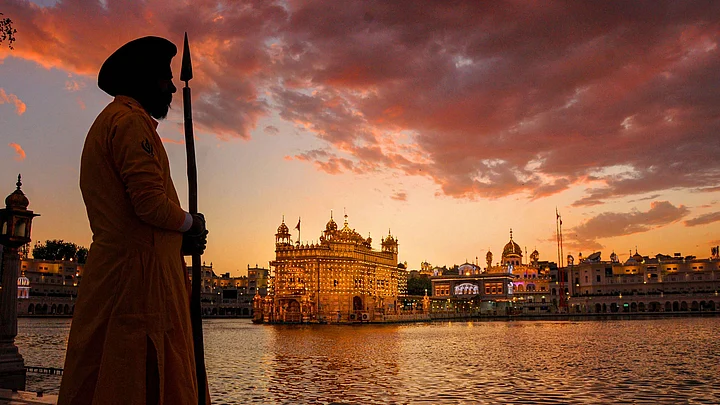Sri Guru Granth Sahib, the religious scripture of the Sikh people, is envisaged as the “Living Guru”, and the practitioner of the values inscribed in the Granth Sahib or Gurbaani (verses of the Gurus) is the Sikh. This quintessential value system (the idea of Gursikh, literally the “disciple of the master”) is fundamentally embodied in the praxis of the thought we understand today as ‘Sikh’.
Guru Nanak’s emphasis on Kirat Karo (hard work); Vand Chhako (sharing with people) and Naam Japo (meditating upon the name of the creator) further creates a value ecosystem of love, compassion, humility, contentment and truth, and these values integrate with the central idea of “oneness”, which primarily indicates the absence of the “other”. The possibility of “oneness” exists when there is no “other”, reiterates Bhagat Namdev on Anga 485 of the Granth Sahib: “Sabh Gobind Hai / Sabh Gobind Hai / Gobind Binn Nahi Koye (All is God / God is All / Without God, there is Nothing at All).”
A Radical Thought in 17th Century
It would be extremely pertinent to note here that the Guru Granth Sahib is a multilingual and multicultural scripture with the verses of Baba Farid, Bhagat Kabir Das, Bhagat Namdev, Bhagat Ravidas, Bhagat Tarlochan, Bhagat Jaidev and several other Bhagats and Bhatts, along with the baani (verses) of the Sikh Gurus, from the geographical length and breadth of the Indian subcontinent, compiled by the fifth Sikh Guru, Guru Arjan Dev, in the caste-divided Indian society, articulating the “one”, which is true and absolute. The reason to choose the wide range of writings by 36 saint mystics in 17th-century India is an unequivocally radical thought to give space to marginal voices on one hand, and contesting the philosophy of “oneness” on the other.
The Guru is perceived as ubiquitous (Ang-Sang) and the Granth Sahib is referred to as the ‘True Lord’ (Sacha Patshah), the limbs (pages) as anga, the daily installation of Granth Sahib in the sanctum sanctorum of the Gurudwara premises in the dawn as Prakash (literally, radiance) and the retiring of the holy scripture after the sun goes down as Sukhaasan (literally, the posture of rest) on the manja sahib (the special bed) in the room for the resting as Sachkhand (the realm of truth). This meticulous maryada (protocol) of revering the Granth Sahib as the “Living Guru” distinguishes the Sikh ethos (adabb, literally “honour”) of scriptural veneration from other religions.
The Meaning of Punishment
Within this given premise, would there be any space to accommodate words like “blasphemy” in the Sikh praxis? One can only wonder. When there is no “other”, who shall be blasphemed? The maryada or the adabb concerning the Guru Granth Sahib is of supreme significance for a Sikh practitioner, and non-adherence to the protocol is stated as beAdbii (dishonour).
The extreme emotional response by the community, of late, against individuals engaging in beAdbii is quoted as “blasphemy”, which is conceptually erroneous. Having said that, there is no justification of brutality, whatsoever, within the value system the maryada proposes.
Moreover, the ideation of Tankhaiya (punishment/chastisement) in the Sikh domain is reserved for Sikhs only and the punishment of the accepted guilt is confined to Sewa (community service) that can be performed with hands.
It's All Politics
Section 295A of the Indian Penal Code states that deliberate and malicious acts intended to outrage religious feelings of any class by insulting its religion or religious beliefs shall be punished. The 267th Report of the Law Commission of India defined “hate speech” as an expression that is likely to cause distress, offend or incite violence against individuals based on the particular group they’re associated with. Blasphemy – though the phrase “blasphemy” isn’t explicitly mentioned anywhere in the Constitution – is defined as the act of insulting or showing contempt or lack of reverence for God. However, it is made clear that any speech that threatens public harmony or incites violence against a particular group in society will be punished.
The number of cases vis-à-vis religious desecration has seen a significant rise in the last couple of years in Punjab. The Punjab Assembly has unanimously passed The Indian Penal Code (Punjab Amendment) Bill, 2018, to add Section 295AA to the Indian Penal Code, which states that “whoever causes injury, damage or sacrilege to Sri Guru Granth Sahib, Srimad Bhagwad Geeta, Holy Quran and Holy Bible with the intention to hurt the religious feelings of the people, shall be punished with imprisonment for life”. However, the legal fraternity feels it is not in accordance with the mandate of the Constitution and can destroy our social fabric.
Quite categorically, the attempts to desecrate the religious scripture have political motivations and the regularity of these occurrences is alarming. Will the State be able to ensure strict legal measures to prevent polarisation is to be seen in the milieu of elections ahead?
(This is an opinion piece and the views expressed are the author’s own. The Quint neither endorses nor is responsible for them.)
